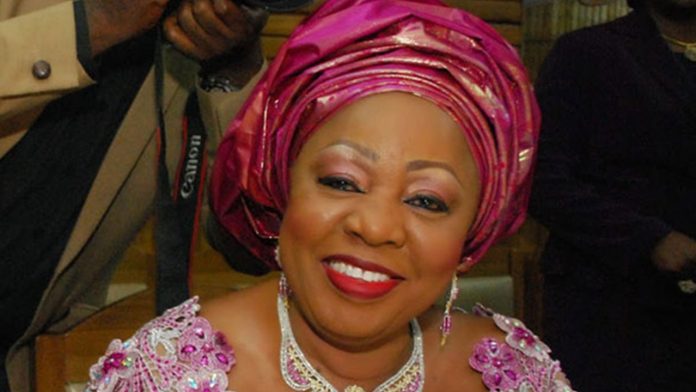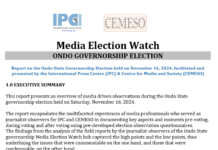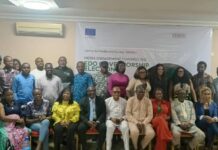On the occasion of International Day of the Girl Child, a coalition of women groups has come up to demand gender parity in elective and appointive positions in public service. The women declared their resolve to advocate for the provision of enabling environment for women to participate in decision making in the country, particularly in policy formulation and execution.
On the objectives of the coalition, the organisers said: “We are resolved to stop vote buying because that is another veritable way of further denying women participation in politics. Women should be allowed to get education; governments should stop all forms of discrimination against the girl child by providing educational opportunities to keep them away from sex slavery and other vices.”
Addressing a press conference at Jevinik Restaurant, Isaac John Street, GRA Ikeja, yesterday, the grand patron of the coalition, Senator Florence Ita-Giwa, disclosed that on the designated the International Day of the Girl Child, “It is our duty as mothers to create a conducive environment for the Nigerian girl child to flourish and thrive.”
She said the emasculation of the Nigerian woman has never been more pronounced as it is today, stressing that women “have been systematically edged out of politics and governance in what appears to be a concerted effort by the political class that is dominated by men.”
Citing the example of the last primary election cycle, the Senator said the process “has taken Nigeria right back to the stone age where women were regarded as nothing, but property for the propagation of the human species through reproduction.
“The gains of the last 20 or so years that saw the emergence of top quality women in governance and politics has been rolled back by an uncaring political class. The memory of our matriarchs who fought hand in glove with the founding fathers for independence of this country has been sorely dishonoured with the way women are today being shunted out of the political space.
“The courageous voices of women like Olufunmilayo Ransome Kuti and Margaret Ekpo who fought for the liberation of Nigeria have been drowned out by the obscene expression of violence, intimidation and money politics being practiced today. From casual observation, it is clear that the current primary elections cycle has seen much less than 10 percent participation by women. This is not because women are not willing to participate in numbers, but because they have been bullied and harassed like never before.”
Senator Ita-Giwa regretted that the recommended 35 per cent affirmation of women in political office has been completely jettisoned, remarking that the few women who braved the hostile environment and insisted on contesting in the recent primaries across party lines were subjected to fierce intimidation and reckless imposition of less qualified male contestants.
“All major political parties are clearly complicit in this assault on women in politics,” she said adding, “I challenge anyone to tell me how many women have been seen on rostrums in political rallies held recently, talk less of the women addressing the rallies. “However, at the ward level of politics women are always mobilized to make up the numbers to endorse male politicians who go on to be delegates. Whenever political agitation is required, women are often recruited to be at the forefront of such agitations only to be pushed aside thereafter.”
She said time has come to do away with the ‘women leader syndrome,’ pointing out that nothing stops women from becoming national chairman of political parties or governors, adding that henceforth any political party that does not give room for adequate participation should forget about earning the votes of women.
She lamented that the escalation of violence in the political space has also scared many women away, adding that the “desperation that consumes many of our male politicians has encouraged the use of guns and machetes in politics.”
The Senator expressed dismay at the new “sickening reliance on money”, saying it has kept many women away from the political arena adding, “It is in the light of all this that we, as women, are launching this campaign to draw attention to the plight of women in the political arena. This campaign is not partisan and comprises of women from all political parties.”
She further said, “The objective is to ensure that women are given respect in Nigeria’s political space. As the primaries have been concluded, we demand that the leadership of all political parties consider submitting the names of all the women unfairly treated during the primaries as replacements for the fraudulently submitted names of men.”
Other demands by the women include that all governorship candidates select women as their deputies to make up for the shoddy treatment of women in the primaries. Failure to do these two things, she said “will see us mount a sustained campaign asking women not to vote for any ticket that does not have a woman as running mate. Only first term governors seeking re-election who already have running mates will be exempt from this boycott.”
To achieve these goals, she said “women will be mobilized to vote for women in all constituencies where a woman is on the ballot regardless of party affiliation. Our “No Woman No Vote” campaign has come to stay and we shall be organising different activities between now and the 2019 general elections to drive home our point.”
Ita-Giwa declared: “The era of impunity in the treatment of women in our political space is over, as we declare that enough is enough. Nigeria has to find a way to create conducive political environment that will allow women participate in the national democratic processes. It is evident that Nigerian women can’t afford to buy any votes.”
While noting that Nigerian women do not have the heartlessness required to purchase guns and machetes for elections, she called on all patriotic citizens to “identify with our noble campaign before women are permanently forced out of the political terrain in Nigeria.”
Other speakers, including Princess Sccholastica Akawor-Ezuma, urged women not be downcast or intimidated, but continue to speak out and participate, stressing that women should eschew pull-her-down-syndrome.
















